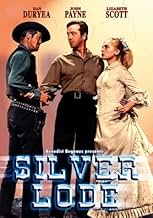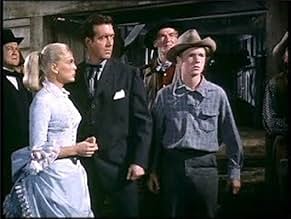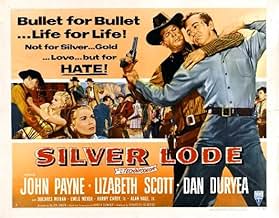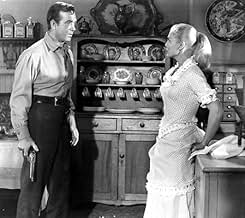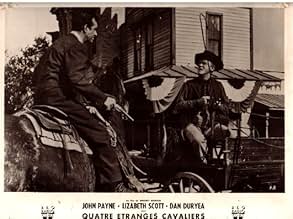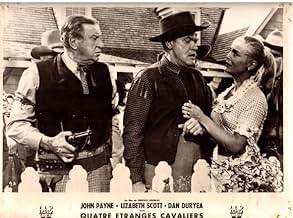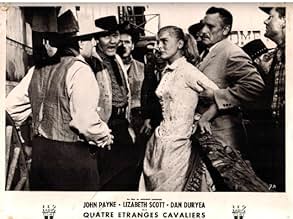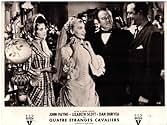IMDb RATING
6.8/10
2.5K
YOUR RATING
In the western town of Silver Lode, Dan Ballard is arrested for murder and theft by marshals, but he denies the charges and searches for the real culprit as the townsfolk gradually turn agai... Read allIn the western town of Silver Lode, Dan Ballard is arrested for murder and theft by marshals, but he denies the charges and searches for the real culprit as the townsfolk gradually turn against him.In the western town of Silver Lode, Dan Ballard is arrested for murder and theft by marshals, but he denies the charges and searches for the real culprit as the townsfolk gradually turn against him.
Walter Bacon
- Townsman
- (uncredited)
Edgar Barrier
- Thad Taylor
- (uncredited)
Marshall Bradford
- Townsman
- (uncredited)
Featured reviews
Silver Lode is directed by Allan Dwan and written by Karen DeWolf. It stars John Payne, Lizabeth Scott, Dan Duryea, Dolores Moran and Emile Meyer. Music is by Louis Forbes and cinematography by John Alton.
Dan Ballard (Payne) is a respected resident of the town Silver Lode, but on his wedding day Marshal Fred McCarty (Duryea) rolls into town looking to arrest him, accusing him of having murdered the Marshal's brother. The townsfolk refuse to accept the charge and stand up for Dan, and Dan loudly protests his innocence, but once suspicious mud is thrown it begins to stick and soon Dan finds himself running out of friends and is therefore forced to prove his innocence.
Two things always pop up when the film Silver Lode is spoken about, one is the similarities to High Noon, the other is the veiled allegory of Senator McCarthy and his witch hunts. These are two things which are hard to ignore, though as a "British" lover of Westerns myself, the McCarthy politico aspect doesn't really resonate, but Silver Lode deserves to primarily be known for being the damn fine Western that it is.
Fickle mob rule and knee jerk reactions drive Silver Lode forward, it's a thematic powder keg ignited with some skill by the prolific Dwann. Aided by the supremely talented Alton, Dwann achieves so much mood and tension from a small town set up, this is never dealing in expansive vistas, its primary goal is to suffocate Dan Ballard. Where once was freedom and love, now is a place closing in on him, with the story moving into a noir realm as Dan becomes a man whose past is proving to be inescapable. Then there is fate, another big noir ingredient, which has a big part in proceedings as events conspire to make Dan seem more of a guilty man the harder he tries to prove his innocence!
It's a lean and mean screenplay, devoid of filler and characterisations are colourful. Payne makes for a good put upon hero, his Dan Ballard as written is stoic and tough, and resilience needs to be his middle name. Duryea does another in his great line of weasels, and here he is wonderfully cloaked in suspicion from the off. Tagging behind him are his three equally suspicious cohorts (played by Stuart Whitman, Alan Hale Junior and Harry Carey Junior), while the upstanding town elders (Sheriff, Judge, Reverend) have time to make a mark before the fragile nature of small town justice begins to take a hold - and the clock is ticking down on Dan Ballard's life.
Most impressive is the influence on the story of the lady characters, so often a token interest in the "B" Westerns of the 50s. Deftly perched on either side of Ballard, the femmes are key characters in the piece. Rose Evans (Scott) is virtuous, brightly attired in white, she's the town sweetheart who Dan is set to marry, the question is will her loyalty to Dan remain? Dolly (Moran giving the best performance in the film and getting all the best lines) is a slinky saloon gal, in purple frills and with a tongue as sharp as a scorpion's sting, she still carries a torch for the unobtainable Dan.
Alton's colour photography is most appealing but we don't see the best of his work until the finale inside the town church. With clever use of light, shadows and colour enhancements, Alton is able to sum up the whole tone of the story in this segment. As for if the finale is worth the wait? It is, but it's a little mischievous. Certainly it's interesting, a quirk of fate again playing a hand as two men do battle in the church bell tower. Notably there's a religious angle dropped into the narrative, but I'm at a loss as to why that would be the case? Still, it's a very small irritant, for this is a cracker of a Western, a lesson in achieving big things from such small beginnings. 8.5/10
Dan Ballard (Payne) is a respected resident of the town Silver Lode, but on his wedding day Marshal Fred McCarty (Duryea) rolls into town looking to arrest him, accusing him of having murdered the Marshal's brother. The townsfolk refuse to accept the charge and stand up for Dan, and Dan loudly protests his innocence, but once suspicious mud is thrown it begins to stick and soon Dan finds himself running out of friends and is therefore forced to prove his innocence.
Two things always pop up when the film Silver Lode is spoken about, one is the similarities to High Noon, the other is the veiled allegory of Senator McCarthy and his witch hunts. These are two things which are hard to ignore, though as a "British" lover of Westerns myself, the McCarthy politico aspect doesn't really resonate, but Silver Lode deserves to primarily be known for being the damn fine Western that it is.
Fickle mob rule and knee jerk reactions drive Silver Lode forward, it's a thematic powder keg ignited with some skill by the prolific Dwann. Aided by the supremely talented Alton, Dwann achieves so much mood and tension from a small town set up, this is never dealing in expansive vistas, its primary goal is to suffocate Dan Ballard. Where once was freedom and love, now is a place closing in on him, with the story moving into a noir realm as Dan becomes a man whose past is proving to be inescapable. Then there is fate, another big noir ingredient, which has a big part in proceedings as events conspire to make Dan seem more of a guilty man the harder he tries to prove his innocence!
It's a lean and mean screenplay, devoid of filler and characterisations are colourful. Payne makes for a good put upon hero, his Dan Ballard as written is stoic and tough, and resilience needs to be his middle name. Duryea does another in his great line of weasels, and here he is wonderfully cloaked in suspicion from the off. Tagging behind him are his three equally suspicious cohorts (played by Stuart Whitman, Alan Hale Junior and Harry Carey Junior), while the upstanding town elders (Sheriff, Judge, Reverend) have time to make a mark before the fragile nature of small town justice begins to take a hold - and the clock is ticking down on Dan Ballard's life.
Most impressive is the influence on the story of the lady characters, so often a token interest in the "B" Westerns of the 50s. Deftly perched on either side of Ballard, the femmes are key characters in the piece. Rose Evans (Scott) is virtuous, brightly attired in white, she's the town sweetheart who Dan is set to marry, the question is will her loyalty to Dan remain? Dolly (Moran giving the best performance in the film and getting all the best lines) is a slinky saloon gal, in purple frills and with a tongue as sharp as a scorpion's sting, she still carries a torch for the unobtainable Dan.
Alton's colour photography is most appealing but we don't see the best of his work until the finale inside the town church. With clever use of light, shadows and colour enhancements, Alton is able to sum up the whole tone of the story in this segment. As for if the finale is worth the wait? It is, but it's a little mischievous. Certainly it's interesting, a quirk of fate again playing a hand as two men do battle in the church bell tower. Notably there's a religious angle dropped into the narrative, but I'm at a loss as to why that would be the case? Still, it's a very small irritant, for this is a cracker of a Western, a lesson in achieving big things from such small beginnings. 8.5/10
Silver Lode (1954) :
Brief Review -
Allan Dwan's underrated and misunderstood western gem. I wasn't aware that a film with similar effects as "Ox Bow Incident" (1943) was made in the 1950s and almost became a gem of a film. John Payne was no John Wayne, so forget about the lead being impactful, but I am really in love with the script. The film is about Dan, who is arrested on his wedding day (which also happens to be 4th July), and asks for two hours to prove his innocence. The charges against him are murder and theft of $20,000, which is more than enough to hang him. Marshall McCarthy has brought all the papers, and they are in order, but he is more into revenge on his brother than arrest and justice. Between these two hours, the entire town goes against Dan, as several killings are blamed on him. It goes up to the mob-lynching stage, and then Dan has to do some killings to prove his innocence. It's an intelligent film despite its quick-go and far-fetched conflicts that take place one after another during one hour. The only two people who believe in Dan are his soon-to-be wife and a bar dancer who loves him. They help him in the process of getting a message sent to the US marshal, but by that time, it's too late. The climax sees Dan standing in a jam, up against McCarthy and the entire town, which used to respect him an hour ago. That's how the human mindset changes within a few minutes. A moment ago, they used to respect him, and a moment later, they wanted to kill him. The performances and production are quite so-so, while the direction seemed fine. The film deserved better dialogues and a better score. Nevertheless, the story and screenplay themselves make it a MUST WATCH. I can't believe this was called "misfire" by contemporary critics and has remained so underrated for years. I personally liked it very much and would recommend it to others.
RATING - 7/10*
By - #samthebestest.
Allan Dwan's underrated and misunderstood western gem. I wasn't aware that a film with similar effects as "Ox Bow Incident" (1943) was made in the 1950s and almost became a gem of a film. John Payne was no John Wayne, so forget about the lead being impactful, but I am really in love with the script. The film is about Dan, who is arrested on his wedding day (which also happens to be 4th July), and asks for two hours to prove his innocence. The charges against him are murder and theft of $20,000, which is more than enough to hang him. Marshall McCarthy has brought all the papers, and they are in order, but he is more into revenge on his brother than arrest and justice. Between these two hours, the entire town goes against Dan, as several killings are blamed on him. It goes up to the mob-lynching stage, and then Dan has to do some killings to prove his innocence. It's an intelligent film despite its quick-go and far-fetched conflicts that take place one after another during one hour. The only two people who believe in Dan are his soon-to-be wife and a bar dancer who loves him. They help him in the process of getting a message sent to the US marshal, but by that time, it's too late. The climax sees Dan standing in a jam, up against McCarthy and the entire town, which used to respect him an hour ago. That's how the human mindset changes within a few minutes. A moment ago, they used to respect him, and a moment later, they wanted to kill him. The performances and production are quite so-so, while the direction seemed fine. The film deserved better dialogues and a better score. Nevertheless, the story and screenplay themselves make it a MUST WATCH. I can't believe this was called "misfire" by contemporary critics and has remained so underrated for years. I personally liked it very much and would recommend it to others.
RATING - 7/10*
By - #samthebestest.
I must admit here and now that I have not seen this film. However, in my research of such B-Westerns, I found that this film was originally shot in 3-D. That has not been mentioned anywhere.
Perhaps the IMDb crew can investigate and make the appropriate notation wherever it is that such notations are made.
I certainly would like to see this film, as it appears to have an interesting cast... John Payne, Dan Duryea, and Lizabeth Scott usually do good work, and the other reviews have generally been positive.
From the reviews, this could perhaps be one of the best 3-D movies made during the 3-D movie craze in the early 1950's... Hondo being another one that could be better.
Perhaps the IMDb crew can investigate and make the appropriate notation wherever it is that such notations are made.
I certainly would like to see this film, as it appears to have an interesting cast... John Payne, Dan Duryea, and Lizabeth Scott usually do good work, and the other reviews have generally been positive.
From the reviews, this could perhaps be one of the best 3-D movies made during the 3-D movie craze in the early 1950's... Hondo being another one that could be better.
Federal Marshal Dan Duryea arrives in the town of Silver Lode with three deputies to arrest one of its citizens, John Payne, on a charge of murder. As things start to happen, Payne who at first has the whole town behind him, loses all his friends save for fiancé Lizabeth Scott and former girl friend Dolores Moran who works in the saloon. By the way, Duryea arrives on the 4th of July which was also to be Payne's wedding day.
This is a classic version of the ill effects of mob violence. Some have said it's a polemic against McCarthyism, no doubt helped by the fact that Duryea's character name is McCarty. For myself Silver Lode is in the tradition of The Oxbow Incident and Fury, both classic films from major studios about vigilante justice.
Silver Lode doesn't have the production values that 20th Century Fox or MGM could bring to a movie, it was done by RKO. Nevertheless supporting Payne, Duryea, and Scott are a solid cast of players, very much at home in westerns. This was also Dolores Moran's last film, she was married to producer Benedict Bogeaus.
Payne had already essayed a very good role in Kansas City Confidential of a wrongly accused man and he follows it up here with an equally good portrayal. It's one of his best film parts.
Allan Dwan keeps things moving at a brisk pace, Silver Lode doesn't bog down for a fraction of a second. One of the best B westerns ever done.
This is a classic version of the ill effects of mob violence. Some have said it's a polemic against McCarthyism, no doubt helped by the fact that Duryea's character name is McCarty. For myself Silver Lode is in the tradition of The Oxbow Incident and Fury, both classic films from major studios about vigilante justice.
Silver Lode doesn't have the production values that 20th Century Fox or MGM could bring to a movie, it was done by RKO. Nevertheless supporting Payne, Duryea, and Scott are a solid cast of players, very much at home in westerns. This was also Dolores Moran's last film, she was married to producer Benedict Bogeaus.
Payne had already essayed a very good role in Kansas City Confidential of a wrongly accused man and he follows it up here with an equally good portrayal. It's one of his best film parts.
Allan Dwan keeps things moving at a brisk pace, Silver Lode doesn't bog down for a fraction of a second. One of the best B westerns ever done.
What could easily have been just another low-budget Western oater or, worse still, the poor man's HIGH NOON (1952), is turned by excellent scripting (atypically the work of a woman!) and direction into a true gem of the genre during its golden age. In fact, the film wears its anti-Red Scare intentions proudly on its sleeve by actually naming its chief villain (Dan Duryea in formidable form) McCarthy and making him an outlaw posing as a fake U.S. Marshal! Reformed gunfighter hero John Payne (in his first of four movies for veteran director Dwan) has his 4th of July wedding (to local belle Lizabeth Scott) disrupted by the arrival in town of Duryea and his men (including Stuart Whitman and Harry Carey Jr.) claiming to have a warrant for his arrest for killing Duryea's brother and absconding with the sum of $20,000. So far so conventional plot-wise but what is remarkable here is the way that the film-makers chose to employ the townspeople who are constantly following the protagonists around the streets of Silver Lode, at first forcibly siding with Payne (to the point of holding Duryea et al at gunpoint) but, with time, being swayed by the latter's lies and an unfortunate series of events that lead them to believe Payne guilty of murdering their sheriff (Emile Meyer) and one of the marshals, as well as wounding Scott's hot-headed brother. Aiding Payne, apart from the unwavering Scott (of course), is his ex-flame, sultry saloon gal (Dolores Moran, the wife of producer Benedict Bogeaus and whose last film this proved to be) who spits one-liner put-downs to hero, villain and everyone in between; I really liked her character and, apparently, so did Dwan because he opted to close the film on the image of her running frantically clenching the all-important telegraphic confirmation (Duryea's men had intuitively cut the lines beforehand) of Payne's claims of innocence. However, in view of the film being a thinly-veiled allegory on the ongoing witch-hunts, it is a telling comment on the relative nature of truth that the girls had already won the day by forcing the gullible telegraph official to write down a false reply. The expected climactic confrontation between Payne and Duryea, then, takes place inside a bell tower with the latter's bullet ultimately ricocheting on himself in God-like retribution making for a doubly ironic ending to a film (beautifully shot in color by the great John Alton) that had held its audience entranced for all of 77 breathless minutes.
Did you know
- TriviaDolores Moran, who plays "Dolly" in the film, was married to producer Benedict Bogeaus at the time of production. It was her last film.
- GoofsWhen Ballard hides near a haystack outside the Evans house, his shadow and the shadows of his pursuers fall on to the painted backdrop, revealing it as canvas and not a real landscape.
- Quotes
Dan Ballard: This man's accused me of murder.
- How long is Silver Lode?Powered by Alexa
Details
- Runtime
- 1h 21m(81 min)
Contribute to this page
Suggest an edit or add missing content

